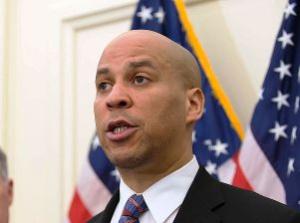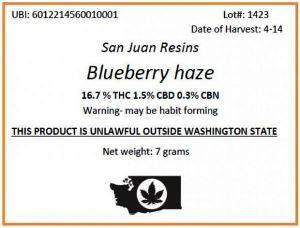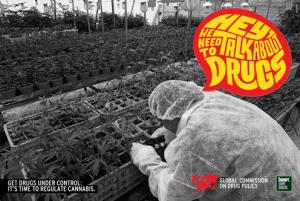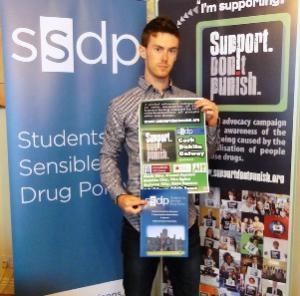The UN's annual anti-drug day is Thursday, but this year, it is going to be met by a counter-campaign calling for drug decriminalization, harm reduction, and human rights in the drug war. "Support, Don't Punish" protests are being held in 80 cities worldwide. Is yours one?
In a landmark ruling for privacy rights, a unanimous Supreme Court has held that police may not search the contents of cell phones and other hand-held devices "incident to arrest." Instead, they must get a warrant.
A Senate companion to the successful House DEA defunding amendment has been filed, New York becomes the 23rd medical marijuana state, a CBD bill is moving in North Carolina, Rhode Island retrenches, and more.
After last-minute compromises between legislators and Gov. Cuomo, the legislature has approved a medical marijuana bill, and Cuomo says he will sign it. But it's more restrictive than patients and advocates would have liked.
Last week may have been slow on the police corruption front, but we make up for it this week. A Washington SWAT team member goes bad, an NYPD officer pays for going bad, a former Colorado sheriff also pays a price, an Arkansas cop gets nailed for protecting what he thought were dope loads, and, of course, more jail and prison guards get in trouble.
We can watch the marijuana policy landscape shift before our eyes, with legalization initiatives and decrim measures popping up around the country and even Oklahoma Republicans arguing over legalization. There is also action on the opiate front, the Senate will vote on defunding the DEA's war on medical marijuana in states where it is legal, and more.
Two killer narcs face consequences for their actions, New York is set to become the 23rd medical marijuana state, the Pope comments on drug policy, prohibition-related violence flares in Mexico and Peru, and more.
Your fearless reporter has been traveling, so our schedule is a little off, but the drug policy news continues. Paul Stanford calls it quits in Oregon, pot shops are coming within days in Washington, an Alabama drug task needs to reconsider its priorities (or maybe the people funding it need to reconsider theirs), and more.
It's UN anti-drug day, and protests to mark it are going on in at least 80 cities around the world, House Republicans move to block DC decrim, the Oregon legalization initiative looks set to make the ballot, the ACLU has a strong new report out on SWAT teams, and more.
This Thursday, June 26, is the United Nations' International Day against Drug Abuse and Illicit Trafficking, which has been used by many governments to justify harsh crackdowns and promote harsh punishments, including exemplary executions. This year, activists around the world will hold their own demonstrations calling not for war more drug war, but for less.
While most UN anti-drug events are fairly anodyne --
last year's highlights include a "sharing best practices" seminar in Vienna and the release of the annual World Drugs Report -- other activities associated with the day are downright gruesome. In 2008,
Indonesia marked the day by resuming drug executions; in 2009,
China celebrated it by executing 20 people, and last year,
China got a jump on events by executing six people in the run-up to anti-drug day.
Civil society is saying "enough." In more than 80 cities across the globe, activists gathering under the banner "Support, Don't Punish: Global Day of Action" will be taking to the streets to protest against policies that have led to mass incarceration, the exacerbation of health crises, and the prospering of violent criminal drug trafficking organizations. Instead, "Support, Don't Punish" will call for a more effective and humane approach to the drug issue, one based on public health, harm reduction, and human rights.
While the global drug war is estimated to cost $100 billion a year -- with unclear impact for reducing harms related to substance abuse -- "Support, Don't Punish" calls for investments in proven, cost-effective harm reduction responses for people who use drugs, and for the decriminalization of people who use drugs and the removal of other laws that impede public health services.
The campaign is truly global, with the endorsement of more than 150 organizations, including not only well-known groups such as the Drug Policy Alliance and the International Drug Policy Consortium, but also local, regional, and national groups from every continent except Antarctica.
Mass demonstrations and other actions are planned in London, New York, Paris, Warsaw, Mexico City, Kathmandu, Rome, Phnom Penh, Tbilisi, Kuala Lumpur, Moscow and more than 70 other cities. The actions include peaceful demonstrations, street performances, public meetings and workshops, social media campaigns and advertisements on public transportation and billboards.
A trio of activists in different cities around the globe contacted by the Chronicle provide a hint of what to expect.
"In London, we will be holding a demonstration outside Parliament to highlight the failure of the war on drugs and calling on the UK government to end the criminalization of people who use drugs under the 'Support Don't Punish' banner," said Niamh Eastwood, executive director of the British drug NGO
Release, which is organizing the London event. "Additionally, we will be writing to the Prime Minister asking for reform of national policy and asking that the British government commit to meaningful engagement in the international discussions leading to the UN drugs summit in New York in 2016 allowing for discussion of alternatives to prohibition."
"In Mexico City, we have created a microsite that summarizes the ten reasons why every Mexican should be involved and interested in drug policy reform," said Adam Barra, program officer for the youth-oriented organization Espolea. "The site includes video capsules of public figures, as well as info graphics that present the most relevant information to form one's own opinion on drug policy. Lastly, the site includes the support of over 20 national organizations from various sectors of society and diverse thematic focuses," Barra added.
"The site will be launched on June 26, as Bee Open Space in Mexico City, and will be followed by a panel with renowned experts on the subject who will make a balance of the punitive versus the health approaches currently used in Mexico," he continued. "After the panel, guests will be invited to watch a screening of the documentary The House I Live In. We expect 50 people be present at the launching, but we expect half a million unique visits to the site over the next month."
"In Katmandu, we will convene a national symposium, as well as demonstrations and marches here and in five other Nepalese cities, said Anan Pun, founder of the Nepalese Coalition for Health, Human Rights, and Harm Reduction (Coalition H3). "We will be doing awareness-raising and media outreach, as well as building the leadership and advocacy skills of various actors, including media, civil society and community groups, and their networks."
While "Support, Don't Punish" protestors around the planet will be united in calling for reform of the UN drug control system -- the legal backbone of global drug prohibition -- each country has its own particular issues, and the campaign will be addressing those as well.
"We will be highlighting the damage caused by our drug laws at a national level," said Release's Eastwood. "In particular, the fact that drug policing disproportionately targets the Black and Asian communities, with black people being six times more likely to be stopped and searched for drugs than white people, and Asian people twice as likely to be searched. This is despite the fact that both groups use drugs at a lower rate than the white population. This is driving the racial disparity that exists in the criminal justice System in England and Wales," he explained.
"Our drug laws allow for the mass searching of certain communities. In London, for example, drugs searches make up 60% of all stop and searches. Despite being given ample opportunity to reform their practices the police have not been able to address racial disproportionately and we believe real change can only be achieved by reforming the laws and in the first instance ending criminal sanctions for possession of drugs," Eastwood explained.
"Mexico is one of the countries that has taken the war to its last consequences," said Espolea's Barra. "Official figures report over 60,000 deaths and 20,000 disappeared people in the period 2006-2012. In Mexico, only 1.8% of the population reported using drugs in the last year, yet we are seeing an average of 15,000 killings a year because of our drug policies. Former President Felipe Calderon addressed the UN and joined other countries in the region in calling for al revision of the global drug war consensus, and now we await the 2016 UN General Assembly Special Session on Drugs. It is crucial that Mexico improves its drug policy before then."
"In Nepal, we are urging all stakeholders, including the government, policymakers, and parliamentarians to make policy based on science and evidence -- fostering human rights, health and well-being of mankind rather than on total elimination of drugs from the world," said the Coalition 3H's Pun. "This is an important opportunity to build the country capacity for advocacy and mobilize the country for public health and rights-based drug policies. We need to hold our government and every other actors accountable and stand up for humane and evidence based drug policy in Nepal and elsewhere in the globe," he said.
This coming UN anti-drug day is about to get a response like never before. With the global demonstrations, the drug reform movement demonstrates both its worldwide reach and its imperative to change the world not just at the highest international levels, but at home as well. Different countries have different issues, but all of them are burdened by an international drug prohibition regime from the last century. There appears to be a growing consensus that it is time for something new.
back to top
In an unusual unanimous decision, the US Supreme Court Wednesday ruled that police in almost all cases must obtain a search warrant before searching cell phones or other mobile devices. The ruling brings the huge amounts of data Americans store on cellphones, smartphones, and other mobile devices under the umbrella of constitutional privacy protections.
The decision came in two cases, one involving a drug bust and the other a weapons charge. The two cases were consolidated in the court's opinion in
Riley v. California.
In ruling in favor of Americans' privacy, the high court rejected law enforcement arguments that cell phone searches did not require a warrant under an exception that allows police to search the contents of arrested people's pockets to ensure that they are not armed or do not destroy evidence. While that may be convenient for law enforcement, the court held, constitutional rights trump convenience.
The court was clearly aware that modern hand-held devices contain both the quality and quantity of information deserving protection as much as that afforded to people's personal property and effects in their homes.
"Modern cellphones aren't a technological convenience," Chief Justice John Roberts wrote in the unanimous opinion "With all they contain and all they may reveal, they hold for many Americans 'the privacies of life,'" he wrote.
As for law enforcement concerns that the court's ruling would prove an obstacle to some police investigations, Roberts had a pithy retort: "Privacy comes at a cost," he wrote.
And if police have reason to believe such devices may contain relevant evidence, they have recourse, Roberts wrote.
"Our answer to the question of what police must do before searching a cellphone seized incident to an arrest is accordingly simple -- get a warrant."
Of course, that means police must convince a magistrate they have probable cause to seek a search warrant.
The American Civil Liberties Union liked what it saw in the decision.
"By recognizing that the digital revolution has transformed our expectations of privacy, today's decision is itself revolutionary and will help to protect the privacy rights of all Americans," said ACLU legal director Steven R. Shapiro in a Wednesday statement. "We have entered a new world but, as the court today recognized, our old values still apply and limit the government's ability to rummage through the intimate details of our private lives."
back to top
A Senate companion to the successful House DEA defunding amendment has been filed, New York becomes the 23rd medical marijuana state, a CBD bill is moving in North Carolina, Rhode Island retrenches, and more. Let's get to it:
NationalLast Thursday, US Sens. Rand Paul and Cory Booker cosponsored a DEA defunding amendment in the Senate. Sens. Rand Paul (R-KY) and Cory Booker (D-NJ) have cosponsored an amendment to the Justice Department funding bill that would shield medical marijuana patients and providers from the attention of the DEA in states where it is legal. The House passed such an amendment at the end of last month. While an early vote was expected, conflicts between Senate Majority Leader Harry Reid (D-NV) and Minority Leader Mitch McConnell (R-KY) have caused the overall appropriation bill to be delayed.
California
Last Tuesday, the Berkeley city council moved toward permitting a fourth dispensary. The council voted to adopt regulations promulgated by the Medical Cannabis Commission that will set up a process to select a fourth dispensary for the East Bay city of 115,000. This more than three years after voters approved Measure T in 2010, which called for allowing a fourth dispensary. The commission had recommended six dispensaries, but that was too much for the council, which approved one new one in principle and said it would review the situation in a year.
On Tuesday, the Drug Policy Alliance strongly criticized the statewide medical marijuana regulation bill. Senate Bill 1262, which was set to go before the Assembly Public Safety Committee the same day, would leave thousands of patients without access to their medicine, fails to establish effective statewide regulation, and doesn't deal with edibles, the group said in an analysis posted on the California legislature's web site. The bill has already passed the Senate, but still must get through the Assembly.
Also on Tuesday, Desert Hot Springs city leaders expressed support for allowing dispensaries and were quite frank in saying it was all about the tax revenues. The city has an existing moratorium that will have to be removed. Leaders set no timeline at Tuesday's city council meeting.
Also on Tuesday, Lake County supervisors placed a restrictive cultivation measure on the November ballot. The measure would ban collective gardens and limit outdoor parcels to four plants. It is being backed by a group called the Emerald Unity Alliance.
Also on Tuesday, Santa Clara County supervisors voted for a temporary moratorium on dispensaries. The move was in response to San Jose's new regulations on dispensaries and cultivation, which supervisors fear would push them out into the county. Supervisors want time to see how to respond and will revisit the issue at an August 5 meeting.
New York
Last Friday, New York become the 23rd medical marijuana state. The state legislature and Gov. Andrew Cuomo (R) reached a last-minute compromise on medical marijuana, and the state Senate and Assembly approved the compromise bill, Program Bill 57. Gov. Cuomo says he will sign the bill into law, making New York the 23rd medical marijuana state. The bill is more limited than many patients and advocates would have preferred. It forbids smoking medical marijuana, although patients may vaporize or consume it in edibles. It also forbids using the raw plant. And it limits access to those with specified qualifying conditions, including cancer, multiple sclerosis, and epilepsy.
North Carolina
Last Thursday, a limited CBD medical marijuana bill won House committee votes. A bill that would allow some patients to use a high-CBD cannabis oil was approved by the House Health Committee Wednesday and the House Finance Committee. The House approved the measure, House Bill 1220, in a floor vote on Friday.
On Wednesday, the limited CBD medical marijuana bill won a Senate committee vote. House Bill 1220 was approved by the Senate Rules and Operations Committee.
Rhode Island
Last Friday, the legislature amended the state's medical marijuana law. The legislature has amended the state's medical marijuana law to require national criminal background checks on all caregiver applicants and the mandatory revocation of the caregiver registry ID cards for those convicted of a felony. The bill, House Bill 7610, won final approval by the Senate last Friday. It also allows landlords not to lease to cardholders who want to grow and imposes weight, plant, and seedling limits on growing co-ops.
[For extensive information about the medical marijuana debate, presented in a neutral format, visit MedicalMarijuana.ProCon.org.]
back to top
The New York legislature and Gov. Andrew Cuomo (R) reached a last-minute compromise on medical marijuana this week, and today, the state Senate and Assembly approved the compromise bill, Program Bill 57. Gov. Cuomo says he will sign the bill into law, making New York the 23rd medical marijuana state.
The bill is more limited than many patients and advocates would have preferred. It forbids smoking medical marijuana, although patients may vaporize or consume it in edibles. It also forbids using the raw plant. And it limits access to those with specified qualifying conditions, including cancer, multiple sclerosis, and epilepsy.
In all, patients with ten specific diseases or conditions will qualify for medical marijuana. The state will be able to add other conditions, and, under the bill, it must determine within 18 months whether to add Alzheimer's, PTSD, muscular dystrophy and dystonia, and rheumatoid arthritis.
The bill also places restrictions on healthcare providers, such as requiring that all recommendations for medical marijuana be made by physicians (excluding nurse practitioners or physician assistants who can prescribe many other medications) and mandating that participating physicians take a training course, an extremely uncommon requirement in US medicine.
Cuomo, who has never been a big fan of medical marijuana, threw a spanner in the works late last week, demanding a number of changes be made to win his support. This came after the Assembly had already passed the Compassionate Use Act and the GOP-dominated Senate had signaled it would allow a vote.
The sponsors of the Compassionate Use Act, Assemblyman Dick Gottfried (D-Manhattan) and Senator Diane Savino (D-Staten Island) worked over the weekend and through this week to craft a compromise that addressed the governor's concerns, and now, New York has a medical marijuana bill, albeit more restrictive than originally envisioned.
For patients and advocates it was a bittersweet victory.
"Today, the Senate passed a medical marijuana bill that will help some patients in New York, and that is good news," said Susan Rusinko of Auburn, who has multiple sclerosis. "But this bill they passed is far from perfect. With any medication, the decision about the best mode of administration, including smoking for some patients, should be left up to healthcare providersand their patients, and this bill does not do that. We fought hard to get this far, and we'll keep fighting to make sure that New York's medical marijuana program becomes the best in the country."
"I'm pleased that the New York Senate stood with patients and on the side of compassion when they passed the medical marijuana bill today," said Holly Anderson, executive director of the Breast Cancer Coalition of Rochester. "This was a long, hard fight, and we are elated that cancer patients and others will have one more tool to help alleviate disease symptoms and side effects of treatments. But this bill has flaws, including the exclusion of smoking, which may be the cheapest and most effective way for many patients to use medical cannabis. We call on the Commissioner of Health to quickly implement a program that is accessible to all patients, regardless of their income."
"Today the Senate passed a medical marijuana bill that will help some, but not all, seriously ill New Yorkers who could benefit from medical cannabis," said Kate Hintz of North Salem, whose daughter, Morgan, has Dravet's Syndrome, a serious seizure disorder. "As a parent of child with a seizure disorder, I'm glad that my family will be able to access medicine that can help my daughter. But I must remind these lawmakers that they are not doctors. The decision if and how to treat a condition with medical marijuana should be left up to the patient and the doctor, not our government. We will keep fighting for the regulated, flexible program that all New Yorkers deserve."
"This is a huge step for patients in New York who will benefit from this legislation, and without question, today would not be possible but for the dedicated and sustained organizing work by patients, families, and advocates," said Gabriel Sayegh, New York State director for the Drug Policy Alliance.
"And we are especially appreciative of the leadership shown by Assemblyman Gottfried and & Senator Savino," he continued. "This bill is far from perfect. Many of the limitations in this bill -- like the restrictions on conditions and physician-patient relationships -- are unnecessary and not supported by the science. And we know that overly restrictive medical marijuana programs leave patients behind. But if implemented quickly and effectively, this program will help thousands of sick and suffering New Yorkers, who need help now."
"Passage of this measure comes as a relief to thousands of seriously ill New Yorkers and their families. Medical marijuana can be an effective treatment option for a variety of debilitating conditions. For some patients, it is their only option," said Karen O'Keefe, director of state policies for the Marijuana Policy Project.
"While the bill's passage is a significant step forward, it leaves behind thousands of patients. We hope the governor's staff promptly implements the measure and that the health department will approve additional qualifying conditions," O'Keefe added. "Voters overwhelmingly agree that seriously ill people should have legal access to medical marijuana."
Both the Drug Policy Alliance and the Marijuana Policy Project have worked along with state and local organizations for more than a decade to pass a medical marijuana bill in New York.
back to top
Last week may have been slow on the police corruption front, but we make up for it this week. A Washington SWAT team member goes bad, an NYPD officer pays for going bad, a former Colorado sheriff also pays a price, an Arkansas cop gets nailed for protecting what he thought were dope loads, and, of course, more jail and prison guards get in trouble. Let's get to it:
In Seattle,
a King County sheriff's deputy was arrested last Thursday for stealing and reselling ammunition from his SWAT team, peddling dope, and pimping out his wife.
Darrion Keith
Holiwell, 49, went down amidst a broader investigation into corruption among King County deputies, and the department says more arrests could follow.
Holiwell may have sold as much as $45,000 worth of brass bullet casings he stole from the department, which he allegedly used to buy expensive guns for himself and other SWAT team members. He came under investigation after another deputy told the department he may have been physically abusing his estranged wife, and she told investigators he suggested she work as a prostitute and helped her post online ads. He is also charged with selling testosterone to a civilian, and the department says he was likely selling it to other members of the department. Police also found prescription drugs, steroids, and ecstasy when they searched his home. He's in jail under $150,000 bond and awaiting a court hearing next week.
In Ada, Oklahoma, a Pontotoc County jail guard was arrested last Thursday after he was caught trying to smuggle contraband, including marijuana, tobacco, and rolling papers into the county jail. Guard Devin Adams has pleaded not guilty and is out on $50,000 bond.
In Little Rock, Arkansas, a former Little Rock police officer was convicted last Wednesday of charges related to escorting a van he thought was filled with marijuana. Randall Robinson was found guilty of lying to investigators, but acquitted of other charges, including conspiracy to distribute marijuana and attempting to possess marijuana with the intent to distribute. He went down in an FBI sting. No word yet on his sentencing.
In New York City, an NYPD officer was convicted last Thursday of committing a series of violent drug and money rip-offs with a gang of no-gooders. Jose Tejada, 46, a 17-year veteran of the force, was convicted of armed robbery and drug trafficking for participating in three robberies of drug dealers in the Bronx in 2006 and 2007 in which the robbers scored thousands of dollars in cash and cocaine. Tejada was in uniform for at least one of the robberies and used it to gain access to a home where he thought drug dealers were, but which actually belonging to an innocent family. He's looking at up to life in prison.
In Albany, Georgia, a former Pelham jail guard was sentenced last Wednesday to 15 months in federal prison for taking bribes from inmates to smuggle contraband, including marijuana, into the Mize Street Detention Facility. Christopher Cox, 35, is the second jail guard there to be sentenced for contraband smuggling in two weeks. He copped to one count of conspiracy to smuggle contraband into a detention facility in exchange for bribes.
In Centennial, Colorado, the former Arapahoe County sheriff was sentenced last Thursday to 15 months in prison for repeatedly violation his probation after he was convicted of swapping meth for sex with young men. Patrick Sullivan, 71, had been sentenced to two years, but jail time had been in abeyance while he was on probation. He repeatedly tested positive for meth while on probation. Sullivan was the National Sheriff's Association "sheriff of the year" in 2001. He retired the following year, and then went over to the dark side.
back to top
We can watch the marijuana policy landscape shift before our eyes, with legalization initiatives and decrim measures popping up around the country and even Oklahoma Republicans arguing over legalization. There is also action on the opiate front, the Senate will vote on defunding the DEA's war on medical marijuana in states where it is legal, and more. Let's get to it:

US Senator Cory Booker (D-NJ) cosponsors an amendment to cut DEA medical marijuana funding. (senate.gov)
House Fails to Add Rider to Block DC Decriminalization Law. The House Financial Services and General Government Appropriations Subcommittee approved a familiar series of social policy riders on the District of Columbia budget, but did not include one that would seek to undo the city's recent adoption of marijuana decriminalization. It's not a done deal yet, however; such a rider could still be added during the legislative process. The subcommittee did approve riders barring the District from funding needle exchanges or medical marijuana programs.
Delaware Decriminalization Bill Heads for House Floor Vote. A bill that would decriminalize the possession of up to an ounce of marijuana and levy a maximum $250 fine passed the House Public Safety Committee today. House Bill 371 now heads for a House floor vote.
Marijuana Policy in the Oklahoma GOP Governor's Race. In next week's GOP primary, sitting Gov. Mary Fallin is up against two longshot opponents who both favor marijuana legalization. Both Chad Moody, also known as "The Drug Lawyer," and Dax Ewbank, a libertarian-leaning Republican, have come out in favor of freeing the weed. But Fallin says that's not on her to-do list: "I just don't see that it provides a substantial benefit to the people of Oklahoma," Fallin said.
Milwaukee Legalization Initiative Signature-Gathering Drive Underway. A coalition of Milwaukee groups have begun a petition drive to place a municipal legalization ordinance on the November ballot. The measure would legalize the possession of up to an ounce. The groups have until July 29 to come up with 30,000 valid voter signatures. People interested in helping out can get more information here.
Philadelphia City Council Votes to Decriminalize Marijuana. The city council today approved a decriminalization measure introduce last month by Councilman Jim Kenney. Up to 30 grams is decriminalized, with a maximum $25 fine. Four years ago this month, the city began treatment small-time possession as a summary offense, with a maximum $200 fine and three-hour class on drug abuse.
Activists Gather Twice the Signatures Needed for York, Maine, Legalization Initiative. Activists supported by the Marijuana Policy Project needed 100 valid voter signatures to present a marijuana legalization petition to the York Board of Selectmen. They handed in 200. Similar petition drives are going on in Lewiston and South Portland, and Portland voters approved a legalization referendum last year. The local efforts are laying the groundwork for a statewide legalization initiative in 2016.
Medical Marijuana
Sens. Rand Paul, Cory Booker Cosponsor DEA Defunding Amendment in Senate; Vote Could Come as Soon as Tonight. Sens. Rand Paul (R-KY) and Cory Booker (D-NJ) have cosponsored an amendment to the Justice Department funding bill that would shield medical marijuana patients and providers from the attention of the DEA in states where it is legal. The vote could come as soon as tonight or tomorrow. The House passed such an amendment at the end of last month.
New York Governor, Legislature in Tentative Deal as Session Draws to End. With the legislative ticking down its final hours, Gov. Andrew Cuomo (D) and legislative leaders today announced a deal that would allow passage of a medical marijuana pilot program, but would not allow patients to smoke their medicine.
North Carolina Limited CBD Medical Marijuana Bill Wins House Committee Votes. A bill that would allow some patients to use a high-CBD cannabis oil was approved by the House Health Committee Wednesday and the House Finance Committee today.
Drug Policy
Drug Policy in the Colorado GOP Senatorial Race. Former Colorado Congressman Tom Tancredo, who is running for the state's GOP senatorial nomination, is being attacked as a drug legalizer in a radio ad created by a committee supporting former Sen. Mike Copp. While Tancredo supports marijuana legalization and has in the past spoken of the need to consider drug legalization, he says he is not ready to legalize hard drugs and is demanding that the ads be pulled.
Opiates
Vermont Governor Signs Package of Bills Aimed at Opiate Use. Gov. Peter Shumlin (D) Tuesday signed into law a package of bills and executive orders that will ramp up treatment for opiate addiction, but also increase penalties for bringing more than one gram of heroin into the state. The centerpiece of the legislative package is Senate Bill 295, which will fund pretrial screening and drug treatment for suspects before they are arraigned.
New York Assembly Set to Approve Package of Heroin Bills. Gov. Andrew Cuomo (D) and key lawmakers announced Tuesday night that they had a deal on a package of heroin bills that would raise awareness of the issue and increase insurance coverage of heroin treatment. What isn't clear is whether they agreement also includes a series of Rockefeller drug law-style measure passed by the Republican-dominated Senate that would increase criminal penalties for some heroin offenses.
Harm Reduction
DC Police Chief Orders No Arrests for Overdose Victims. In a recent memorandum, Metropolitan Police Department Chief Cathy Lanier has instructed her police force to observe protections from arrest and charge granted under a DC law designed to encourage residents to seek immediate medical assistance for a person experiencing an overdose. The Good Samaritan Overdose Prevention Amendment Act of 2012 (#A19-564), which was passed by the D.C. Council in 2012 and took effect on March 19, 2013, provides limited legal protection from arrest, charge and prosecution for those who witness or experience a drug overdose and summon medical assistance.
Sentencing
Federal Fair Sentencing Act Picks Up Another Sponsor. And then there were 39. Rep. William Envart (D-IL) has signed on as a cosponsor to the Federal Fair Sentencing Act. That makes 25 Democrats, along with 14 Republicans. It would reduce the use of mandatory minimum sentences and impose retroactivity for crack cocaine sentences handed down before 2010.
International
Britain's Looming Khat Ban Could Create Black Market. A ban on khat is about to go into effect in England, and this report suggests that it could create political tensions in East Africa, as well as creating a black market for the substance in England itself.
Albanian Siege of Marijuana-Producing Village Continues. A police assault on the village of Lazarat that began Monday is still underway as clashes continued between police and armed villagers. Some 800 police are involved in the operation, and they say they have seized or destroyed more than 10 tons of marijuana so far. But that's only a fraction of the 900 tons the village is estimated to produce annually. The town's $6 billion pot crop is equivalent to about half Albania's GDP.
(This article was published by StoptheDrugWar.org's lobbying arm, the Drug Reform Coordination Network, which also shares the cost of maintaining this web site. DRCNet Foundation takes no positions on candidates for public office, in compliance with section 501(c)(3) of the Internal Revenue Code, and does not pay for reporting that could be interpreted or misinterpreted as doing so.)
back to top
Two killer narcs face consequences for their actions, New York is set to become the 23rd medical marijuana state, the Pope comments on drug policy, prohibition-related violence flares in Mexico and Peru, and more. Let's get to it:

Killed by a Utah narc. Finally, there might be some justice for Danielle Willard. (facebook.com)
FDA Studying Whether to Reclassify Marijuana. The Food and Drug Administration (FDA) is studying whether marijuana should be moved from Schedule I -- no medical use, high potential for abuse -- to a less restrictive schedule. The agency is acting at the request of the DEA, which is considering another rescheduling petition. Federal agencies have fended off efforts to reschedule marijuana for more than 40 years. The FDA reviewed marijuana's classification in 2001 and 2006 and found no reason to change it then.
Medical Marijuana
New York to Become 23rd Medical Marijuana State. The New York legislature and Gov. Andrew Cuomo (R) reached a last-minute compromise on medical marijuana this week, and today, the state Senate and Assembly approved the compromise bill, Program Bill 57. Gov. Cuomo says he will sign the bill into law, making New York the 23rd medical marijuana state.The bill is more limited than many patients and advocates would have preferred. It forbids smoking medical marijuana, although patients may vaporize or consume it in edibles. It also forbids using the raw plant. And it limits access to those with specified qualifying conditions, including cancer, multiple sclerosis, and epilepsy.
Drug Policy
Pope Says Nope to Dope. Pope Francis told participants at a drug control conference that he opposes marijuana legalization, and he's not so sure about using opiate maintenance to treat heroin users. 'Drugs are an evil, and with evil you can't give way or compromise," Francis said. "Even the partial legalization of so-called recreational drugs, besides being questionable on legal grounds, doesn't produce the intended effects," according to the text of his remarks posted on the Vatican web site.
California Set to End Ban on Food Stamps for Drug Felons. The California legislature has approved a bill that will once again allow people with drug felonies to obtain food stamps. A 1996 federal law barred drug felons from food stamp programs, but also gave states the ability to opt out. With the passage of Assembly Bill 1468, which Gov. Jerry Brown (D) is expected to sign, California will have done so. Only 12 other states continue to ban drug felons from getting food stamps.
Harm Reduction
North Carolina Injury Free Medication and Drug Overdose Prevention Summit Coming Next Month. State agencies and non-profits will take part in medication and overdose prevention summit on July 14 in Raleigh. Click on the lick for more details.
Law Enforcement
Utah Narc Charged With Manslaughter in Death of Danielle Willard. Former West Valley City Police undercover narcotics officer Shaun Cowley has been charged with manslaughter in the November 2012 shooting death of Danielle Misha Willard. Willard, who was unarmed, was shot and killed as she backed up her car in an apartment building parking lot. Cowley and another officer, who were investigating heroin sales, claimed they feared for their lives, but prosecutors didn't buy it. "Mr. Cowley acted in a reckless manner, and the evidence that we have does not support that his life was in danger or give him the justification to use the force that he did," said Salt Lake County prosecutor Sam Gill. The case has already resulted in a major shake-up in the department, and Willard's family has already filed a civil lawsuit.
Georgia Narc Must Pay Millions to Family of Pastor He Killed in Drug Investigation. A federal judge has ruled that Georgia undercover narc Billy Shane Harrison used unreasonable force in the killing of Pastor Jonathan Ayers and must pay his widow $2.5 million. Harrison shot and killed Ayers in a convenience store parking lot as Ayers attempted to drive away from undercover officers approaching him. They thought Ayers had some connection with a woman they were investigating, but he was just acting as a pastor.
International
Cartel Drug Wars Inflaming Mexico's Tamaulipas State. Dozens of people have been killed and numerous others have gone missing in Mexico's northeastern state of Tamaulipas since April as factions of the Gulf Cartel fight for dominance there. Click on the link to read more.
Peru Clashes Leave Soldier, Shining Path Guerrillas Dead. A Peruvian army soldier and three suspected Shining Path guerrillas have been killed in gun battles this week between security forces and suspected drug traffickers in the VRAE (Valleys of the Apurimac and Ene Rivers), a major Peruvian coca producing region. The soldier died fighting "narco-terrorists," Peruvian authorities said.
back to top
Your fearless reporter has been traveling, so the schedule is off, but the drug policy news continues. Paul Stanford calls it quits in Oregon, pot shops are coming within days in Washington, an Alabama drug task needs to reconsider its priorities (or maybe the people funding it need to reconsider theirs), and more. Let's get to it:

Coming soon to a store near you -- if you live in Washington state.
Paul Stanford Pulls Plug on Oregon CRRH Initiative. Paul Stanford, the man behind the Campaign for the Restoration and Regulation of Hemp legalization initiatives, announced Friday that had given up the effort to qualify for the November ballot. That leaves the New Approach Oregon initiative, which is well over 100,000 signatures. It needs some 87,000 valid voter signatures to qualify, and the campaign still has another week to get more signers.
Washington State Liquor Control Board Says First Marijuana Retail Stores Will Open July 8. The board, which is charge of legal marijuana commerce, said it will issue the first licenses July 7, but that the licensees would have to spend that first day getting their product into their store tracking programs.
Medical Marijuana
Rhode Island Legislature Amends Medical Marijuana Law. The legislature has amended the state's medical marijuana law to require national criminal background checks on all caregiver applicants and the mandatory revocation of the caregiver registry ID cards for those convicted of a felony. The bill, House Bill 7610, won final approval by the Senate last Friday. It also allows landlords not to lease to cardholders who want to grow and imposes weight, plant, and seedling limits on growing co-ops.
Collateral Consequences
Missouri Governor Signs Bill to End Food Stamp Ban for Drug Felons -- With Conditions. Gov. Jay Nixon signed into a law a bill that would allow people with drug felonies to obtain food stamps, but only if they submit to drug tests and an assessment to see if they need drug treatment, which they must enroll in and complete if they are determined to need it. The bill is Senate Bill 680. The 1996 federal welfare reform law banned drug felons from obtaining food stamps, but allowed states to opt out. By now, more than 30 have.
Opiates
Federal Bill Targeting Heroin, Prescription Opiates Filed. US Sens. Kelly Ayotte (R-NH) and Joe Donnelly (D-IN) have filed legislation that seeks to respond to rising levels of opiate use by creating a "Pain Management Best Practices Inter-Agency Task Force" to develop prescribing practices that aim to ensure "proper pain management for patients, while also preventing prescription opioid abuse." Along with federal agencies such as HHS, Defense, the VA, and the DEA, the task force would include treatment providers, people from pain advocacy groups and pain professional organization, and experts in pain research and addiction research. Pain advocates will be watching carefully. The bill, Senate Bill 2504, would also provide grants to expand prescription drug monitoring programs.
Law Enforcement
Texas to Spend $1.3 Million a Week on "Border Surge" Aimed at Immigrants, Drugs. Using the influx of underage immigrants across the US-Mexican border as a jumping off point, Texas authorities announced last week they plan to spend $30 million this year tightening border security, with a major emphasis on law enforcement and cutting drug flows. Gov. Rick Perry (R) has also asked President Obama to send a thousand National Guard troops, to be joined by hundreds of Texas troopers Perry is deploying to the border. What this will mean on the ground is more troopers patrolling the highways, more surveillance, more undercover operations -- in an area already sinking under the weight of the billions spent beefing up border security since 9/11.
Alabama Drug Task Force Gets Busy With Chump Change Drug Round-Up. The West Alabama Narcotics Task Force based in Tuscaloosa arrested 24 people last Friday in a round-up that "stemmed from multiple ongoing investigations." But they were almost entirely charges like "unlawful sale of marijuana within three miles of a school" ($30,000 bond), "unlawful possession of drug paraphernalia" ($5,000 bond), and "unlawful possession of marijuana" ($15,000 bond). Only five of the charges didn't involve marijuana, and of those, three were for possession of a controlled substance, two were "unlawful sale of cocaine within three miles of a school," and one was for "interfering with government operations."
International
Vietnam Upholds Death Sentences for 29 Drug Smugglers. A Vietnamese appellate court last Thursday upheld the death sentences for 29 people convicted. The court reduced one other death sentence in the case to life in prison. The sentences came in what is Vietnam's largest heroin case ever, with 89 defendants and 1.5 tons of heroin involved.
Bolivia Coca Cultivation Drops to 11-Year Low. Coca cultivation declined 9% in Bolivia last, reaching the lowest level since 2002, according to the annual Bolivian coca survey conducted by the UN Office on Drugs and Crime (UNODC). This is the third straight decline, in line with the Bolivian government's commitment to reduce production to 50,000 acres by 2015. The 2013 crop was about 55,000 acres.
British Medical Association to Debate Legalizing Marijuana. Britain's largest doctors' organization will debate a motion calling on it to legalize marijuana as its Annual Representatives Meeting continues this week after a weekend hiatus. "The current law isn't working and only by adopting a different approach can we regulate, educate and exert a level of quality control," the motion says. "Cannabis use should be treated primarily as a health issue, not a criminal justice issue."
back to top
It's UN anti-drug day, and protests to mark it are going on in at least 80 cities around the world, House Republicans move to block DC decrim, the Oregon legalization initiative looks set to make the ballot, the ACLU has a strong new report out on SWAT teams, and more. Let's get to it:

fundraiser for the Florida medical marijuana initiative, at the Vicente-Sederberg law firm following the NCIA summit
Cannabis Business Summit Draws Big Crowd in Denver. More than 1,200 people attended the Cannabis Business Summit sponsored by the National Cannabis Industry Association in Denver this week. Look for a Chronicle report on it in coming days.
Oregon Legalization Initiative to Hand in Signatures Today. It looks like Oregonians will vote on marijuana legalization this November. The New Approach Oregon initiative campaign will hand in 145,000 signatures to state officials today; they only need some 87,000 valid ones to qualify for the ballot.
House Committee Votes to Block Decriminalization in DC. The House Appropriations Committee yesterday passed an amendment to the 2015 Financial Services and General Government Appropriations bill intended to prevent the District of Columbia from implementing its recently passed law decriminalizing the possession of marijuana. It also has the potential to end the District's medical marijuana program. The amendment, offered by Rep. Andy Harris (R-MD), passed by a vote of 28-21. Reform advocates will seek a floor vote to remove this amendment from the bill when it proceeds to the House floor.
No Vote on Legalization in the Rhode Island Legislature. The 2014 legislative session has ended without the Marijuana Regulation, Control, and Taxation Act never coming up for a vote. Maybe next year.
Oakland Shuts Down a Trio of Measure Z Speakeasies. For the past decade, recreational marijuana retail outlets have quietly operated in Oakland, protected by Measure Z, which makes the private use of marijuana by adults law enforcement's lowest priority. But in recent weeks, Oakland police have raided and shut down three of the speakeasies. The police say their enforcement actions are driven by complaints.
Sentencing
Two More Cosponsors for the Smarter Sentencing Act. The Smarter Sentencing Act has picked up two more cosponsors, bringing the total to 41, 27 Democrats and 14 Republicans. The latest cosponsors are Rep. Ann Kuster (D-NH) and Rep. Katherine Clark (D-MA).
Senate State and Foreign Operations Funding Bill to Include Sentencing Reform Language. Advocates working with Senate Judiciary Chair Pat Leahy's (D-VT) office report that the Senate committee report on the issue will include language making sentencing reform part of US foreign policy and an issue the State Department promotes when working on police training and judicial reform in other countries. Click the link to read the language.
Law Enforcement
ACLU Issues Report on Militarization of American Policing. The American Civil Liberties Union has released a new report on the excessive militarization of American policing, War Comes Home. The report concentrates on the use of SWAT teams, and fnds that 80% of SWAT deployments were not hostage rescue or other dangerous missions, but to serve search warrants, mainly for drugs. The report also examines the abuses associated with SWAT teams. This is strong stuff.
International
Global Demonstrations Against Drug War Today Mark UN Anti-Drug Day. Protestors in at least 80 cities around the world are taking the opportunity of UN anti-drug day to call not for more drug war, but for less. Click on the link for more details.
British Khat Ban Now in Effect. The British ban on the East African herbal stimulant plant khat has now gone into effect. There are fears the Somali community will be targeted and that a black market will now emerge.
British Doctors Reject Marijuana Legalization, Urge Cigarette Ban for Those Born After 2000. Meeting at their annual conference, members of the British Medical Association rejected a proposal to call for legalizing marijuana, but voted in favor of a ban on cigarettes for people born after 2000. The BMA's rejection of legalization was "both unscientific and unethical," said Steve Rolles of the Transform Drug Policy Foundation.
Uruguay's First Grower's Club Begins Registration Process. The Association of Cannabis Studies of Uruguay has registered to become the first officially recognized marijuana growing club in the country. The club headed by Laura Blanco will have 40 members. Joining a club and enjoying the fruits of collective grows is one of three ways to legally obtain marijuana under Uruguay's new law. The other options are registering to buy it from pharmacies or growing your own individually.
Mexico Wants More Black Hawk Choppers for Anti-Drug Activities. Mexico has formally requested to purchase five UH-60M Black Hawk helicopters for it war on drugs. The choppers are to be equipped with GPS/inertial navigation systems, forward-looking radar systems, and 10 7.62mm machine guns each. The proposed deal would be worth an estimated $225 million
back to top










